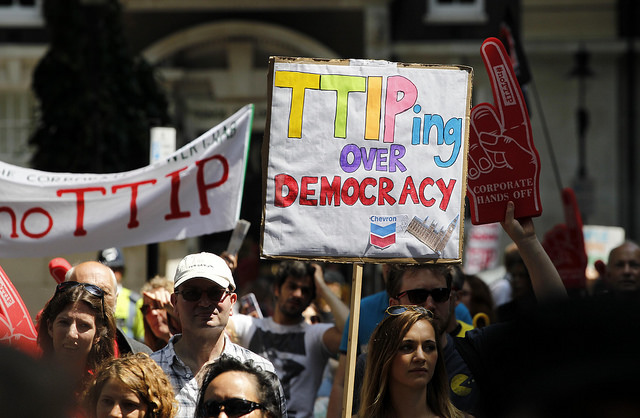Call for participation
On 7 and 8 July 2017, the Leaders of the Group of 20 (G20) will meet in Hamburg. This self-styled club of 19 of the most powerful economies in the world and the EU claims to fight global crises. However, reality reveals a different picture:
- The G20 defends a system that exacerbates social disparities instead of leading policies against deprivation and hunger and enabling justice and prosperity for everyone on this planet.
- The governments of many G20 countries undermine the rights of employees, unemployed people and self-employed workers, thus aggravating the redistribution of income and wealth from the bottom to the top.
- They prioritize economic growth over politics to stop global warming and the destruction of natural resources.
In response to the 2008 financial crisis, the G20 was to establish global rules in order to stabilize and limit the growth of the financial sector. Yet, the financial sector has continued to grow steadily and now expands investment even into new areas such as ecosystem services or public service infrastructure.
- Many G20 governments approve arms exports, thus militarizing conflicts even further, such as in Afghanistan or in Syria, and even against parts of their own population, as in Turkey.
- The policies of the G20 governments are contributing to flight and migration of millions of people. At the same time, many of these governments are closing their borders, risking the deaths of thousands of people every year.
- In many G20 countries, fundamental rights and democracy are diminished. Actions by people standing up for social and environmental concerns as well as human rights are more and more often criminalized.
- The G20 claims to strengthen international cooperation. But after all, the club effectively weakens the UN and its special agencies.
All this means: The G20’s policies are part of the problem.
We are convinced that other policies are possible! This is why we meet for the „Global Solidarity Summit“! It is high time for all of us standing up for different policies or already practicing them, to agree on how to turn things around. We need to assess interdependencies between global problems and address them at their roots.
We ask:
- How can we defeat poverty, exploitation, oppression, war and the destruction of nature?
- How can we enforce social rights on a global scale?
- How can we strengthen participatory and democratic rights?
- How can we effectively combat racism, misogyny and homophobia?
- How can we create a community based on cooperation, self-determination and solidarity?
- What does an economic system look like that actually serves the needs of the people rather than profiteers?
- What are the principles for global policymaking, including for the G20? And, what do alternative political approaches look like?
We will meet on 5 and 6 July in Hamburg. We will bring together and amplify our criticism, discuss alternatives and, above all, build alliances and develop strategies for implementation.
Be part of the solidary alternatives!
We call individuals, groups, organizations and social movements to contribute their proposals and to participate in making the summit program as diverse and spirited as possible. If you want to support this call, please register at
“Sign the Call” by April 18.
Our summit will be more diverse and lively with your workshop contributions. Please submit a short description of the workshop or other activities that you are planning at
“Submit a workshop” by April 18. There are several possible event formats such as lectures, workshops, networking events, writing workshops, films or artistic performances. We will have to deal with limitations to provide venues for workshops and you should also look for your own financial support. Therefore, we may not be able to consider all the proposals submitted or try to combine related applications. We will however do our very best to accommodate as many activities as possible.


